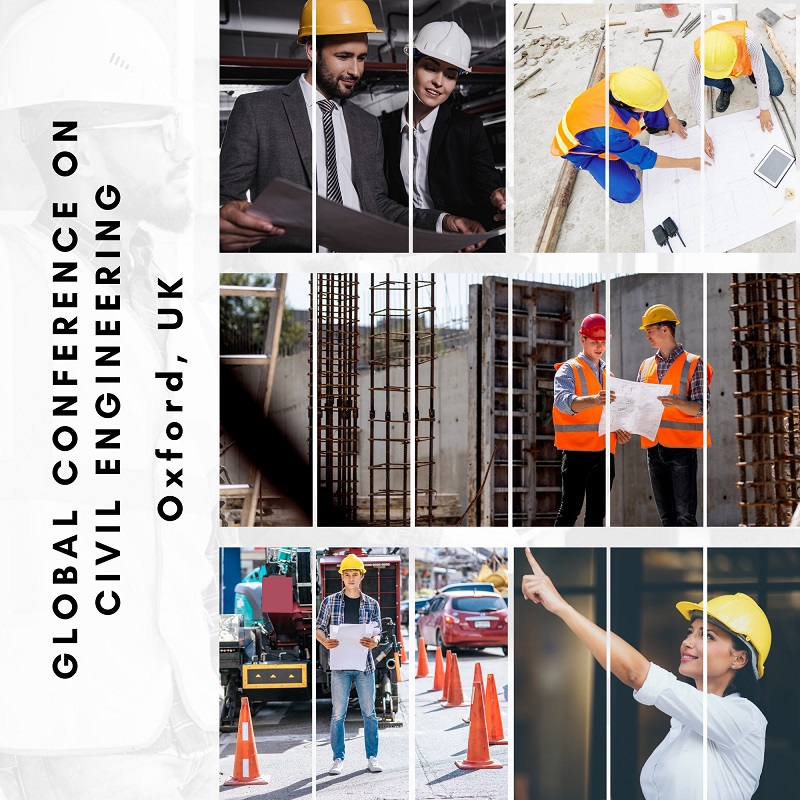
Thems and Topics
The Global Conference on Civil Engineering on 03 – 05 June 2022 in Oxford, the United Kingdom encourages all to present their recent research work. This conference is considered a prestigious event organized with the motivation to provide an excellent international platform for academics, researchers, managers, industrial participants, and students to share their research findings with global experts. All full paper submissions will be peer-reviewed and evaluated based on originality, technical and/or research depth, accuracy, and relevance with the theme of the conference.
The conference is seeking submissions related to the following conference topics: Civil engineering, Mechanics of Materials, Damage and Fracture Mechanics, Foundation Engineering, Soil Reinforcement and Geosynthetics, Earthquake Engineering, Computational Mechanics and Modeling, Railway Bridges, Environmental Engineering, Water Resources Management and Transportation Engineering . Other related tracks and topics will also be considered.
Learn More About Topics
- Advance construction techniques
- Advanced earthquake resistant techniques
- Bamboo as a building material
- Bio diesel
- Canal irrigation
- Carbon fibre use in constructions
- Condition assessment of railway bridges
- Cyclone resistant building construction
- Defluorination of ground water
- Demolition of buildings
- Design of efficient surface aerators for waste water treatment
- Disaster management
- Engineering modelling of earthquake source
- Evacuation patterns in high rise buildings
- Geotextiles
- Ground improvement techniques
- Hazardous waste management
- High rise buildings
- Highway network management
- Hydrology
- Intelligent bridges
- Low-cost housing
- Nanotechnology in civil engineering
- Noise control of buildings
- Optimization of water resource systems
- Parking problems
- Pavement design
- Rainwater harvesting
- River mechanics
- River restoration
- Seismic site characterization
- Soil nailing
- Solar building
- Solar energy
- Solid waste management
- Stress Ribbon Bridge
- Structural dynamics
- Structured irrigation network
- Submerged floating tunnels
- Suspension bridges
- Urban design
- Use of remote sensing for irrigation water allotment
- Activated carbon adsorption
- Bacterial concrete
- Biofiltration of air
- Biomedical waste management
- Climate Change on Rainfall and Streamflows
- Climate Hydrology
- Contaminant Transport
- Deep Geological Repository
- Defluoridation of Ground Water
- Electrokinetic Decontamination of Soils
- Energy auditing fundamentals
- Environmental site assessment
- Expansive Clays
- Fluoride rich groundwater
- Green building
- Hazardous waste management
- Membrane bioreactors
- Membrane technology
- Modern air pollution control technologies
- Noise control of buildings
- Osmotic Suction
- Ozone in water treatment
- Phytoremediation
- Pollution Induced Heave in Soils
- Recycling of plastics
- Re-Use of Hazardous Wastes
- Solute transport
- Surface Aerators for Waste Water Treatment
- Water Distribution Network
- Water Quality Control in Streams
- Bacterial concrete
- Burnt Clay Brick Masonry
- Creep and Shrinkage in Concrete Density
- Fiber Reinforced Concrete
- Green concrete
- High-performance concrete
- Lightweight concrete
- Repair of Concrete Elements
- Stabilized Mud Block
- Stabilized Rammed Earth Walls
- Transparent concrete
- green accent wall
- Cementitious Interfaces
- Continuum Damage Mechanics [CDM]
- Fatigue and Fracture Behavior of Plain Concrete
- Thermal Stress Intensity Factors
- Dynamic response of machine foundations
- Interference effect of footings and anchors
- Practical Equivalent Continuum Model
- Rock Mechanics
- Rock Slopes
- Seismic Bearing Capacity of Foundations
- Seismic Earth Pressures
- Stress-Strain Behavior of Rocks
- Coir Fibers for Sustainable Development
- Geocell Reinforced Foundation Beds
- Geosynthetic Reinforced Unpaved Roads
- Soil Nailing
- Earthquake Load Modeling
- Inelastic Seismic Analysis
- Pre and Post Liquefaction Behavior of Soils
- Seismic Hazard Estimation and Microzonation
- Seismic Response of Reinforced Soil Retaining Walls
- Seismic Site Characterization
- Shock Table Studies for Earthquake Resistant Design
- Structural Vibration Control
- Diffused Double Layer parameters
- Finite Element Limit Analysis
- Geosynthetic reinforced soil structures
- Granular soil behaviour and liquefaction
- Integrated Force Method (IFM)
- Ultimate bearing capacity
- Air Travel Demand Modeling
- Automated highway systems
- Bridge bearings & stability
- Cell filled pavements
- Coal pavements
- Design considerations for roadside safety
- Development of robotic bridge
- Exploring BRTS for accident reduction
- Flexible pavement
- Geo-textile in transportation applications
- High-speed track
- Highway & transportation engineering
- Highway alignment optimization
- Highway failure & their maintenance
- Highway network system
- Instant concrete road repair solution
- Integral bridges an innovative concept
- Integrated Mass Transit Planning
- Intelligent transport system (ITS)
- Noiseless pavements
- Pavement design by using geotextile
- Pavement microtexture monitoring
- Perpetual pavement
- Plastic roads
- Polymer composites in bridge rehabilitation
- Road Safety and Mobility
- Urban transport Strategy Development
- Web-based Transit Passenger Information System
- Flow Measurements
- Groundwater Recharge Estimation
- Hydraulics
- Hydrochemistry
- Optimization in Water Resource Systems
- Precipitation and land-use controls on the groundwater chemistry
- Remote Sensing for Irrigation Water Allocations
- River Mechanics/ Sediment Transport Mechanics
- Root Zone Soil Moisture
- Stochastic Hydrology
- Structured Irrigation Network
- Sustainable Groundwater Use
- Water Balance Studies
- Watershed Hydrology
- Reliability in Civil Engineering Systems
- Reliability Based Design of Foundations
- Spatial Variability of In-situ Soil
CECONF
Conference Themes and Topics
Submitted abstracts will be evaluated by the Scientific Committee. If abstract is accepted, the author agrees to send full-text paper, including results, tables, figures and references. All submissions should report original and previously unpublished research results no matter the type of research paper you are presenting. Full-text papers (.docx and .doc) will be accepted by Electronic Submission Form. Manuscripts should meet the format set by the Conference committee and are subject to review.
For more information about the conference, you are welcome to contact the organizing committee directly via info[at]ceconf.org.
Paper Submission
In order to submit a paper, an author is required to create an online account on the conference website. Only manuscripts submitted via the online submission system will be considered for review.
To invite colleagues to participate in the conference and submit original research for the conference Call for Papers.


